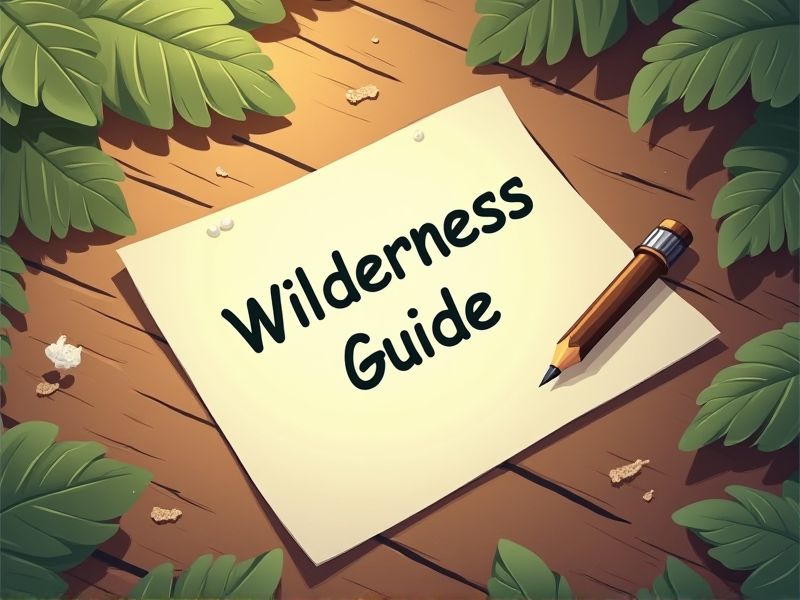
Being a Wilderness Guide involves leading others through potentially dangerous and unpredictable natural environments. Certifications ensure that guides are equipped with crucial skills in first aid, navigation, and survival techniques. These qualifications not only protect the clients but also enhance the guide's credibility and trustworthiness. Here are some key certifications you might need to pursue a career as a Wilderness Guide.
Wilderness First Responder (WFR) Certification
A Wilderness First Responder (WFR) Certification equips a guide with essential first aid and emergency care skills, ensuring immediate and effective response to injuries in remote areas. Without ready access to conventional medical help, these skills become critical for ensuring safety and wellbeing in the wilderness. Certification also increases a guide's credibility and trustworthiness, often being a standard requirement by employers and clients alike. Such preparedness can significantly mitigate risks and enhance the overall experience for participants in outdoor adventures.
Advanced Wilderness First Aid Certification
Advanced Wilderness First Aid Certification equips wilderness guides with life-saving skills, enabling them to effectively handle medical emergencies in remote environments. The certification provides comprehensive knowledge about prevention and management of injuries and illnesses common in the wilderness, reducing potential risks for clients. This training ensures the guide can deliver informed care when immediate professional medical assistance is not available. The certification builds trust with clients, promoting a safe and reliable environment during wilderness expeditions.
Wilderness Survival Certification
Wilderness survival certification equips guides with vital skills to ensure safety, reducing the likelihood of accidents during excursions. It provides essential knowledge for handling emergencies like injuries or equipment failures in isolated environments. Certified guides gain credibility, which attracts more clients seeking reliable and safe adventures. Legal and insurance requirements often necessitate certification to protect clients and operators from potential liabilities.
Leave No Trace Trainer Certification
Guiding in the wilderness without Leave No Trace Trainer Certification increases the risk of environmental degradation, impacting ecosystems negatively. Certification ensures guides are equipped with knowledge to minimize human impact, preserving natural landscapes for future generations. It enables guides to educate participants effectively on sustainable practices, promoting responsible outdoor ethics. The certification enhances credibility and trust among clients, often leading to increased demand for certified guides.
CPR and Basic Life Support (BLS) Certification
Wilderness guides encounter remote environments where emergency medical services aren't readily available, making CPR and BLS skills vital for immediate intervention. Proper certification equips them to handle cardiac and breathing emergencies, improving survival chances during critical moments. The unpredictable nature of wilderness conditions often leads to injuries or medical emergencies, necessitating guides be prepared to manage such situations effectively. Having CPR and BLS certification boosts a guide's credibility and assures clients of their ability to provide competent emergency care.
Emergency Medical Technician (EMT) Certification
Gaining EMT certification equips wilderness guides with the skills to handle medical emergencies in remote areas where professional help may not be immediately available. This certification provides a foundational understanding of life-saving techniques, crucial in environments where injuries or illnesses can arise unexpectedly. Wilderness guides often find themselves in isolated terrain, so having the ability to provide immediate care can significantly improve outcomes for individuals in need. Many organizations require their guides to possess EMT certification to ensure the safety and well-being of their clients during wilderness expeditions.
Swiftwater Rescue Certification
Swiftwater Rescue Certification equips wilderness guides with essential skills for managing risks associated with river crossings and fast-moving water environments. When unexpected water-related incidents occur, guides with this certification respond effectively, reducing the risk of injury or fatality. Many river and wilderness areas have regulations that require guides to hold such certifications, impacting their employability and the operational standards of guiding companies. With swiftwater rescue training, guides enhance the overall safety and confidence of their clients, promoting a positive experience in nature exploration.
Rock Climbing Safety Certification
Obtaining a rock climbing safety certification reduces the risk of accidents when a wilderness guide leads climbers. It ensures that guides are knowledgeable about proper climbing techniques and safety protocols. Certification provides a standardized measure of a guide's competency, boosting trust among climbers. In high-risk environments, certified guides can make critical decisions quickly, enhancing overall group safety.
Navigation and Orienteering Certification
Navigation and orienteering certification is necessary for wilderness guides because it ensures a fundamental understanding of terrain and map-reading skills. This certification minimizes the risk of getting lost, which is crucial for maintaining the safety of the group. Employers and clients often seek certified guides as it builds trust and credibility in delivering a reliable outdoor experience. Proper navigation skills contribute significantly to conservation efforts by preventing habitat disruption and guiding groups along designated paths.
Outdoor Leadership Certification
Outdoor Leadership Certification equips wilderness guides with essential skills for safety and risk management in unpredictable environments. Certified guides demonstrate a standardized understanding of navigation, survival techniques, and environmental ethics, crucial for leading diverse groups effectively. Certification enhances credibility and trust among clients, as it signifies a commitment to professional standards and continuous learning. It also provides a competitive edge in the job market, as employers often prefer candidates with formal training and verified competencies.
Summary
When you acquire certifications as a wilderness guide, your credibility significantly increases, attracting more clients. Certified guides often experience higher earning potential due to the perceived value and trust from customers. You will also expand your skill set, enhancing safety and efficiency in outdoor excursions. Opportunities for collaboration and network growth emerge, connecting you to a broader community of outdoor enthusiasts and professionals.
